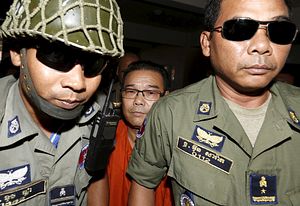As Prime Minister Hun Sen continues a streak of crackdowns and power plays aimed at weakening Cambodia’s main opposition party, the country’s precarious “culture of dialogue” seems to be in danger of devolving into a stern lecture under the longtime autocrat a little over a year after an initial bipartisan truce was struck.
A Phnom Penh court’s decision to deny an opposition senator’s request for bail and postpone his trial is the latest test for the “the culture of dialogue,” the moniker given to the country’s uneasy political peace forged between Hun Sen and Cambodia National Rescue Party (CNRP) President Sam Rainsy in the aftermath of 2014’s bloody post-election season and a tense 10-month political standoff.
“The culture of dialogue is basically a farce,” said Ou Virak, the head of Future Forum, a Phnom Penh-based policy institute. “It was not there from the beginning. You have two parties who are pretty much vying for power, trying to play nice, and that was basically it.”
Hun Sen’s actions have primarily stemmed from politicians and activists directly challenging his ruling Cambodia People’s Party (CPP) by using longstanding issues and uncertainties surrounding the Cambodian-Vietnamese border demarcation as a political rallying tool. In addition to Sok Hour’s alleged actions, members of the opposition have clashed with Vietnamese villagers and used social media to play off of many Cambodians’ deep-seated racism and insecurities over their neighbor.
But rather than actually engage in a dialogue about the border, it appears the premier is using his power and influence to stamp out his political opponents. This year, Cambodian courts have jailed 11 opposition activists accused starting an “insurrection” in 2014 and politicians such as Sok Hour on Hun Sen’s command, seemingly to subdue a party he has recently referred to as a “gang of thieves” and a traitorous “landmine.”
“[The culture of dialogue] ended with the arrest with the 11 activists, and the nail in the coffin was the SRP senator getting arrested,” Virak said.
For Billy Chia-Lung Tai, an independent human rights consultant formerly with Cambodian Human Rights Action Committee (CHRAC), Hun Sen seems to be using the political ceasefire to unload on the country’s opposition movement.
“I certainly don’t remember Hun Sen being so overtly hostile to the opposition for a very long time,” he said. “Now that Hun Sen has the CNRP in a ‘dialogue,’ he needs to get started on the job of weakening the opposition.”
In Tai’s view, Hun Sen’s calculated strikes against the opposition raises questions about what exactly the culture of dialogue was meant to be in the first place: a political deal between the CPP and the CNRP, or a personal agreement between Hun Sen and Sam Rainsy.
“Perhaps we misunderstand what this phrase fundamentally means. At the beginning, I was thinking this was about the opposition and the ruling party getting together and perhaps formulating some policies,” he said. “But what I’m beginning to believe is that it was always supposed to be more personal: a dialogue between Sam Rainsy and Hun Sen.”
The dialogue, Tai added, appears to have also been a way to “neutralize” Sam Rainsy, a once-fiery leader who (in)famously tore out border demarcation posts, as a true political threat.
But as far as government spokesman Phay Siphan is concerned, Rainsy and Hun Sen have always been the facilitators of the political dialogue, even when, in his opinion, Rainsy and CNRP Vice President Kem Sokha have in the past used the culture of dialogue to “overrule the rule of law.”
“Nobody can be above the law – they have to respect the law, no matter what the party,” he said.
Siphan went on to say that any repercussions members of the opposition have faced thus far have been well deserved.
“The culture of dialogue means, sometimes, face-to-face talking, and not insulting or offending. It means trying together to build a strong democracy,” he said. “[The CNRP] tries to [rally] the people to abuse the system… The people that have been arrested, it means that they committed a crime.”
When asked in an email to comment on the apparently deteriorating dialogue, senior CNRP member Mu Sochua quoted Sam Rainsy as saying: “I am trying to sew and to mend Cambodia’s fabric.”
“The culture of dialogue endorsed by both leaders of the two political parties is a fact and not a farce,” Sochua wrote. “However, we must admit that it is new for the parties as well as for the people of Cambodia. Peace does not happen over night and peace needs all to sign up for it.”
Sochua cited a recent talk between Rainsy and Deputy Prime Minister Sar Kheng concerning commune election laws as evidence that the dialogue was going strong, though she added that her party is well aware of the challenges it faces, especially ahead of Cambodia’s 2018 elections, given the current situation.
“The agreement to engage in dialogue and to build it for the nation was inked by both parties on July 22, 2014. It was an agreement for peace and not for war,” she continued. “Mutual trust and respect are prerequisites to move the dialogue forward and to make it a norm that is then transformed into a culture.”
Freelance journalist who has reported from Cambodia, Indonesia and Vietnam.
*The Diplomat originally characterized the Sam Rainsy Party as “defunct.” Although it is integrating with the Cambodian National Rescue Party and will officially disband after the next Senate elections, it still officially remains a party.

































